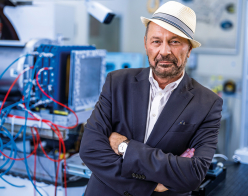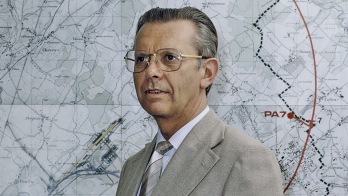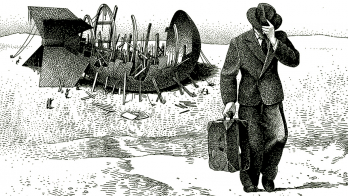
Michele Arneodo, professor of physics at the University of Piemonte Orientale and chairperson elect of the CMS Collaboration Board, passed away on 12 August 2025. He was 65.
Born in Turin in 1959, Michele graduated in physics from the University of Torino in 1982. He was awarded a Fulbright Fellowship to pursue graduate studies at Princeton University, where he received his MA in 1985 and his PhD in 1992. He began his career as a staff researcher at INFN Torino, before moving to academia as an associate professor at the University of Calabria and then, from 1995, at the University of Piemonte Orientale in Novara, where he became full professor in 2002.
Michele’s research career began with the European Muon Collaboration (NA2 and NA9) and the New Muon Collaboration (NA37) at CERN, investigating the structure of nucleons through the deep inelastic scattering of muons. He went on to play a leading role in the ZEUS experiment at DESY’s HERA collider, focusing on the diffractive physics programme, coordinating groups in Torino and Novara, and overseeing the operation of the Leading Proton Spectrometer. Awarded an Alexander von Humboldt fellowship, he worked at DESY between 1996 and 1999.
With the start of the LHC era, Michele devoted his efforts to CMS, becoming a central figure in diffractive physics and the relentless force behind the construction of the CMS Precision Proton Spectrometer (PPS) and the subsequent merging of the TOTEM and CMS collaborations. He was convener of the diffractive physics group, served on the CMS Publication and Style committees, and from 2014 chaired the Institution Board of the CMS PPS, where he was also resource manager and INFN national coordinator. He had been appointed as chairperson of the CMS Collaboration Board, a role that he was due to begin this year.
A central figure in diffractive physics and the relentless force behind the construction of the Precision Proton Spectrometer
Teaching was central to Michele’s vocation. At the University of Piemonte Orientale, he developed courses on radiation physics for medical students and radiology specialists, building bridges between particle physics and medical applications. He was also widely recognised as a dedicated mentor, always attentive to the careers of younger collaborators.
We will remember Michele as a very talented physicist and a genuinely kind person, who had the style and generosity of a bygone era. Always approachable, he could be found with a smile, a sincere interest in others’ well-being, and a delicate sense of humour that brought lightness to professional exchanges. His students and collaborators valued his constant encouragement and his passion for transmitting enthusiasm for physics and science.
While leaving a lasting mark on physics and on the institutions he served, Michele also cultivated enduring friendships and dedicated himself fully to his family, to whom the thoughts of the CMS and wider CERN communities go at this difficult time.
Michele, “Rest forever here in our hearts”.








